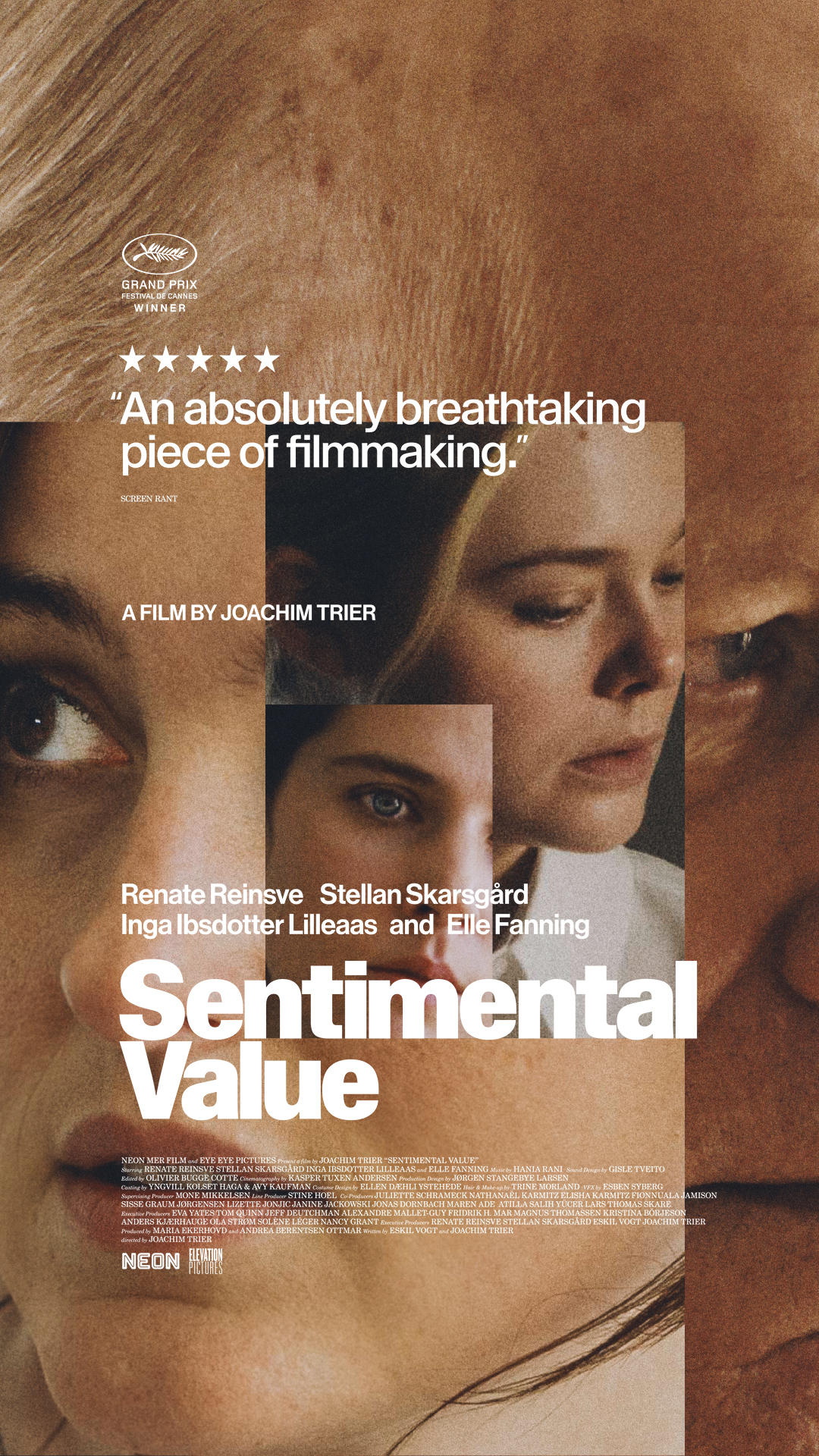
- Starring
- Renate Reinsve, Stellan Skarsgård, Inga Ibsdotter Lilleaas, Elle Fanning
- Writers
- Joachim Trier, Eskil Vogt
- Director
- Joachim Trier
- Rating
- n/a
- Running TIme
- 135 minutes
- Release Date (US)
- November 7th, 2025 (limited)
- Release Date (CAN)
- November 14th, 2025
Overall Score
Rating Summary
This will be one of many reviews during this year’s Toronto International Film Festival, to keep up with our latest coverage, click here.
Sentimental Value reunites director Joachim Trier with Renate Reinsve, who plays Nora, a gifted stage actress whose talent is undermined by constant panic attacks and deep-seated depression, rooted in abandonment issues caused by her father’s absence. In contrast to Nora’s turbulent brilliance, her sister Agnes, portrayed with striking depth by newcomer Inga Ibsdotter Lilleaas, is steadier and more grounded. Agnes seems to have worked through the same childhood traumas, in part because Nora, as the older sister, shielded her from much of the fallout during their parents’ marriage collapse.
When their mother suddenly passes away, their estranged father, internationally renowned filmmaker Gustav Borg (Skarsgård), returns to Norway, partly to reconcile with his two daughters. He offers Nora the lead role in a film he has already written as a way to reconnect, but when she vehemently refuses, he hires Rachel Kemp (Fanning), a rising Hollywood actress. Borg chooses to shoot the film in their family home, a space whose cracked walls mirror the fractures within the family. This setting provides a layered exploration of familial tension, examining the struggle many artists face between maintaining meaningful relationships and pursuing artistic greatness.
Here, Trier once again proves himself a master of humanist filmmaking. While countless family dramas have explored fractured relationships between absent fathers and their adult children, he reinvents the formula, delivering a deeply resonant and empathetic story that will move audiences to tears without ever feeling like it’s actively trying to manipulate audiences into having that reaction. The authenticity of the film owes much to Trier and Eskil Vogt’s remarkable script, which fleshes out the characters fully and captures their dynamics with an unflinching realism that feels so lived-in. Much like The Worst Person in the World, the film is structured in segments, frequently shifting perspectives to give each character a moment to shine. At the same time, it places a deep emphasis on the family home as a repository of their most intimate memories. Trier experiments with this concept, splicing in sequences from a different time period, creating a layered narrative that at first feels convoluted, but eventually enriches the film as a whole.
The most remarkable aspect of Sentimental Value is its performances. Reinsve is clearly in sync with Trier’s creative vision, and their latest collaboration once again shines on screen. Though their previous effort was arguably more of a showcase for Reinsve, Sentimental Value functions more as an ensemble piece. However, as Nora, she offers up a devastatingly heartfelt portrayal of a woman deeply scarred by her father’s absence, carrying childhood traumas into adulthood while grappling with profound depression and anxiety. Her subtle reactions convey intense emotional depth, making it easy for audiences to empathize with her character. Meanwhile, Skarsgård gives a career-best performance as Gustav, a character that is lived-in and magnetic despite his deep flaws; a man burdened by a lifetime of regrets, struggling to confront his mortality, and unable to express his feelings except through his art.
The supporting cast contributes equally to the ensemble’s strength. Lilleaas is a subtle but an essential presence as Agnes, acting as a bridge between Nora and Gustav and holding the family together. Her performance is imbued with so much empathy, it is clear she has the potential to become an extraordinary talent. Fanning is also very impressive as Kemp, a Hollywood actress navigating the pressures of her career while feeling like a fish out of water in a Norwegian-language film. She captures the tension of wanting a career-defining role while questioning if she’s truly right for it, adding yet another layer to the film’s exploration of ambition, art, and personal connection.
In the end, Sentimental Value is a richly rewarding follow-up; one that is sure to find a broad audience across generations and emerge as a mainstay this awards season. It’s a deeply affecting family drama, anchored by a finely tuned script, subtle yet assured direction, and a phenomenal ensemble delivering some of the year’s most remarkable performances. Trier offers a compelling exploration of familial trauma, showing how art can both fracture and mend our most important relationships.
still courtesy of Elevation Pictures
If you liked this, please read our other reviews here and don’t forget to follow us on Twitter or Instagram or like us on Facebook.

Discover more from
Subscribe to get the latest posts sent to your email.
